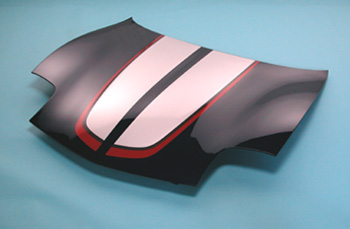| Summary: |
The first carbon fiber class A exterior body panel on an
OEM vehicle priced below $100K with a production volume > 2,000 per year.
Weight reduction of 33% compared to a standard Corvette hood. |
| Most Innovative Feature: |
The first carbon fiber Class A exterior body panel on an
OEM vehicle priced below $100K at a production volume greater than
2000/year. |
| Other Innovative Features: |
The unidirectional carbon fiber outer panel is bonded to a
hybrid carbon fiber/low density SMC inner panel. |
| What Forming Process? |
Hand lay-up on Invar tooling, vacuum bag & autoclave cure
on the outer panel. Compression molding on the inner panel. |
| First Time Process Used: |
Yes, for a major OEM. The process has previously been
used only for exotic sports cars and racing vehicles. |
| Previous Process: |
Standard SMC for the outer panel, low density SMC for the
inner panel, compression molded. |
| Tooling Innovations: |
First automotive production use of Invar tooling. |
| New Material Developments: |
Fast curing epoxy prepreg resin system (10 minute cure
versus 120 minutes typical of aerospace systems used for exotic and racing
vehicles). |
| Weight Savings: |
The carbon fiber hood weighs 4.8Kg (10.6 lb) less than a
standard Corvette hood. This represents a 33% mass reduction. |
| Cost Savings: |
None. |
| Cost Avoidance: |
Tooling costs were $1.9 million lower than compression
molding tooling for all parts. |
| Direct Consumer Benefit: |
Due to the reduction in mass, the vehicle's performance is
increased. HP/Kg is increased, resulting in faster acceleration and
lower fuel consumption. |
| Translates to Other Vehicles?: |
Yes, extensions of this application/technology are in
development on other vehicle lines at GM. |
| Safety Benefits: |
None. |
| Environmental Benefits: |
None. |
| Additional Comments: |
None. |






